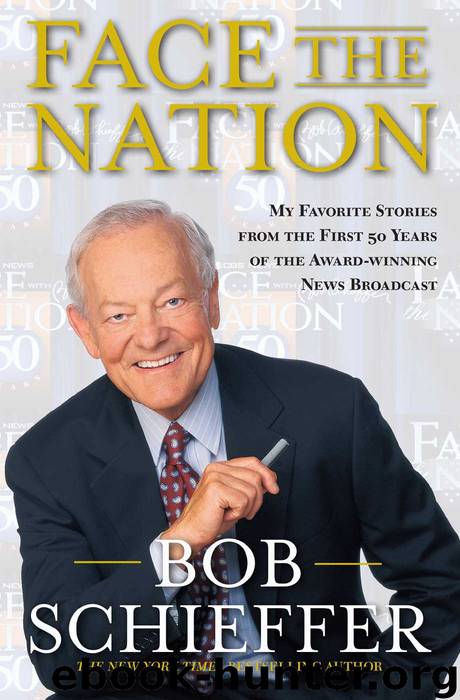Face the Nation: My Favorite Stories from the First 50 Years of the Award-Winning News Broadcast by Schieffer Bob

Author:Schieffer, Bob [Schieffer, Bob]
Language: eng
Format: epub
Publisher: Simon & Schuster
Published: 2013-01-15T00:00:00+00:00
9
The Sunday Primaries
Tales from the Campaign Trail
Go vote! It will make you feel big and strong!
The author, election eve 2000
I love politics, so it will come as no surprise that my favorite stories about Face the Nation have usually come from our political broadcasts. In presidential politics especially, Face the Nation has always played an important role. Candidates have used the program to launch campaigns and to end them—sometimes on purpose, sometimes not.
Alabama Governor George Wallace had threatened to run in 1964, but when Barry Goldwater got the Republican nomination, Wallace came on Face the Nation to say he had achieved his goal of “conservatizing” both parties and folded his campaign.
That same year, Pennsylvania Governor William Scranton wrecked his presidential campaign on Face the Nation with a performance so wobbly that he was no longer taken seriously as a candidate.
In 1972, Missouri Senator Tom Eagleton appeared on Face the Nation to explain why he had not disclosed he had been treated for mental illness before McGovern picked him as his running mate. After the questioners had spent most of the broadcast talking about Eagleton’s mental state, McGovern realized the issue would never go away. The next day, he announced that Eagleton would be leaving the ticket.
The Sunday talk shows are made for politics. They are not places for investigative journalism or long, in-depth feature stories. They are places where candidates can be questioned directly and at some length about their positions on the issues during live, unedited interviews.
My competitor Tim Russert had it right when he once told me, “What we do is not complicated; we turn on the studio lights and ask questions.”
Therein lies the value of these broadcasts.
Candidates appear on them knowing they’ll get tough, no-nonsense questions, but they also know that if they do well, they’ll gain stature in the eyes of voters. The Sunday broadcasts have become such important stops on the campaign trail that the candidates call them the “Sunday primaries.” In the summer of 2003, we began coverage of the coming campaign by inviting the likely candidates to be interviewed. I asked a key Democrat if he thought the early interviews were all that important since most Americans were not yet focused on politics.
“Oh yes,” he said. “Most Americans are not focused on primaries but the political community—the people who give money, the political consultants, the party activists—are already looking for a horse, for someone to back. How these candidates do on these early Sunday shows has a tremendous impact on those people. It’s a long journey to any nomination, but the first step for a candidate is convincing the political community that he or she has the stuff to slug it out on Sunday. The shows really are important in that sense.”
I have always believed that the most successful politicians in every era have been those who mastered the dominant media of their day. In colonial America, the world got most of its news by printed word, and that remarkable group of men we know as the founding fathers were all writers of exceptional skill.
Download
This site does not store any files on its server. We only index and link to content provided by other sites. Please contact the content providers to delete copyright contents if any and email us, we'll remove relevant links or contents immediately.
| Direction & Production | Genres |
| Guides & Reviews | History & Criticism |
| Reference | Screenwriting |
| Shows |
Head of Drama by Sydney Newman(2024)
Robin by Dave Itzkoff(2006)
I'm Judging You by Luvvie Ajayi(1892)
The Paranormal 13 (13 free books featuring witches, vampires, werewolves, mermaids, psychics, Loki, time travel and more!) by unknow(1849)
Single State of Mind by Andi Dorfman(1512)
Ten by Gretchen McNeil(1494)
#MurderTrending by Gretchen McNeil(1395)
Key to the Sacred Pattern: The Untold Story of Rennes-le-Chateau by Henry Lincoln(1351)
Most Talkative by Andy Cohen(1311)
Merv by Merv Griffin(1266)
This Is Just My Face by Gabourey Sidibe(1180)
Notes from the Upside Down by Guy Adams(1180)
Jamie Oliver by Stafford Hildred(1148)
The Hunger Games: Official Illustrated Movie Companion by Egan Kate(1119)
Springfield Confidential by Mike Reiss(1106)
Clarkson--Look Who's Back by Gwen Russell(1078)
The TV Writer's Workbook: A Creative Approach To Television Scripts by Ellen Sandler(1070)
Blue Planet II by James Honeyborne & Mark Brownlow(1021)
Dark Angel by D. A. Stern(1014)
